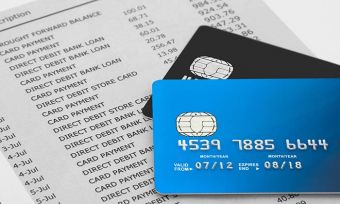A credit score, or credit rating, is one of the most important factors in your financial life. A credit history report allows lenders to do a credit rating check on your financial fitness, before giving you credit. Mortgage lenders will also do a credit check and, sometimes, even employers and landlords check your credit history.
Unfortunately, poor financial decisions can show up on your credit score, and follow you wherever you go. Here are 11 financial mistakes to avoid, to give you the best shot at a healthy credit score.
1. Missing a credit card or loan repayment
Making late payments, or missing repayments on credit cards or loans, is a sure fire way for borrowers to ruin their credit score. A big part of your credit score is based on your payment history, so make sure you budget around your monthly bills. It’s not just your credit cards and loans that you need to pay on time, either. Even your phone plan and electricity bills will show up on your credit history if you don’t pay them on time every month.
As well as damaging your credit score, failing to make required repayments means racking up unnecessary interest. This could be a good time to compare credit cards, to check you’re using the most suitable product, or to have a think about whether it’s a good time to have a credit card at all.
Compare credit cards with Canstar
2. Maxing out your credit limit
“Maxing out” your credit card, by spending up to your credit limit, is a risky business. When calculating your credit score, lenders consider your credit utilisation ratio (also called the debt utilisation ratio or debt-to-credit ratio), which is the amount of available credit you are currently using.
Most online sources agree that a credit utilisation ratio of about 50% will begin to affect your credit score. Spending between 10% and 30% of the available credit limit may be less likely to hurt a borrower’s credit rating.
3. Applying for balance transfers too often
Every time you apply for a balance transfer to repay a credit card debt, an official enquiry is made on your credit report.
Back-to-back balance transfers are when someone transfers their credit card debt onto a new card with a balance transfer interest rate, doesn’t repay it during the balance transfer time frame, and transfers it to a new balance transfer card.
By doing this, a borrower is almost certain to be seen as unreliable, or unable to meet the required repayments, and it can negatively affect their credit score.
If you do get a balance transfer, make every attempt to knock off the debt within the time period when the interest rate is 0% or at another low rate.
Read more on balance transfers here
4. Closing credit cards that have a good repayment history
Another common mistake that people make is closing credit cards that they’ve faithfully repaid for years.
You may think it makes sense to close a credit card if you’ve paid it off completely and you no longer need to use it. It does make sense – but keep in mind that a “good account” like this helps your credit score. Closing the account means it won’t contribute to making your credit score look reputable to lenders.
5. Applying for several credit cards or loans at the same time
Applications for credit cards or loans – which lenders call “enquiries” – have a definite impact on your credit score. Making several credit or loan applications to different lenders, within a short period of time, makes you seem desperate for credit, and negatively affects your credit rating.
6. Getting a judgement
In worst case scenarios, creditors will sue borrowers for unpaid debts. If the court rules a judgement that a person must repay their debt, it’s a big black mark on their credit history.
It shows that not only did the debtor avoid paying bills, but it was to such a severe extent that the courts became involved. This is something that will ruin your credit score and make it extremely difficult for you to take out a loan again.
7. Ignoring errors on your credit report
Errors or inaccuracies are introduced in many ways but, not knowing about the errors, or ignoring the errors and not fixing them, is an easy way to ruin your credit score.
Some bills and payments, such as medical expenses or hospital bills, go through long, complicated billing processes and, therefore, are more likely to introduce errors or inaccuracies. If you have to fix up a problem with a bill, it’s also wise to go online and check your credit report to see whether it has been affected by the error.
8. Credit reporting agencies in New Zealand
There are three credit rating agencies that will generate a credit history report for you. Agencies in New Zealand include:
- Equifax has data on more than 3.4 million New Zealanders and approximately 600,000 companies and businesses.
- Credit Simple is a credit reporting agency for consumers that provides you with a credit report once you create a free account with them.
- Centrix advises that it will provide you with a free copy of your credit report, usually within 48 hours of completing an online application. You can find out more information here.
9. Not alerting creditors when you change your name
While this may sound trivial, it’s one of the most common reasons for inaccuracies on credit reports. If you get married or divorced, you must inform all financial institutions about this change of details so that no mistakes end up on your credit report.
Another thing to consider is that while credit reporting agencies (credit bureaus) may keep separate credit scores for spouses, the actions of your partner can still impact your credit score. If one spouse fails to pay a joint bill or joint credit card on time, both of your credit scores will be negatively impacted.
10. Borrowing money to boost your credit score
As unbelievable as it is, there are actually scam credit schemes that bill themselves as “credit score boosters”. Many of the schemes are based outside New Zealand and entice people to pay to piggy-back on a line of credit with a perfect rating by becoming an authorised user.
Such schemes can be incredibly expensive to join, and require you to submit sensitive identification information that can be open to misuse. Ultimately, borrowers are better off using their money to repay existing debts than wasting money on quick-fix scams.
Real ways to fix a bad credit score can be found on our website but, in short, they do take some time to implement. The sooner you start acting to improve your credit score, the sooner it will improve.
11. Credit Check: The danger of not knowing what’s on your own report
It’s important to check your credit score regularly, to see if there’s anything there that shouldn’t be.
Unfortunately, identity theft and fraud are common crimes. By regularly reviewing your credit report, you can check that no one is using your name to borrow money or run up serious debts.
It’s easy to check your credit score and get a free copy of your credit history. Don’t put it off!
If your credit score is looking good – and you’re ready to apply for a loan or a credit card – compare your options using our website.




Share this article